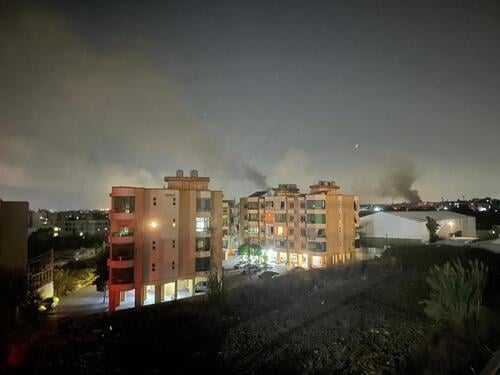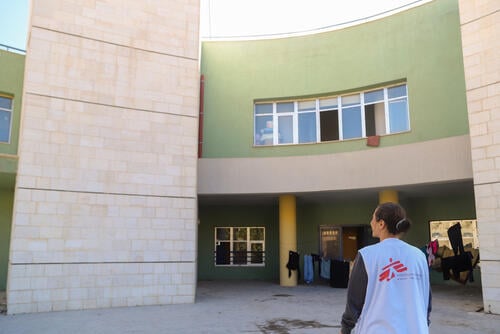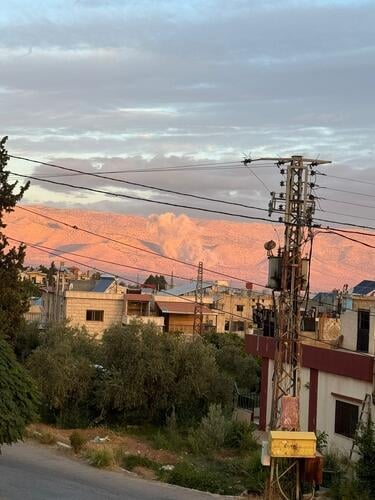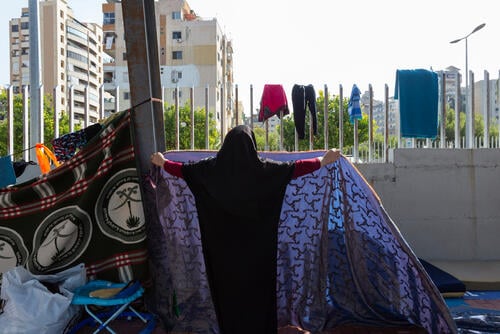Maryam Srour, is a field communications manager for Médecins Sans Frontières (MSF) from Beirut, Lebanon, who was in the southern suburbs on 27 September. She reported from a car as she fled bombing, describing scenes of chaos.
On Friday, 27 September, we heard and felt a huge series of blasts while we were in meetings at the office. We wrapped up work and got stuck in heavy traffic. I had just relocated to a safer place since the bombing around Beirut, and across the country, intensified on Monday. When I reached my new home around 10 pm, my relatives had already joined us – they left their homes thinking it would be safer where we were.
From my balcony, I saw dozens and dozens of people walking in the streets carrying what they could; plastic bags, backpacks, or nothing. People in the southern suburbs around ours had received evacuation orders from the Israeli armed forces. We saw people fleeing on foot, some walking with sticks, young and elderly. Some people were in cars.
We were not in the neighbourhood that was targeted but we heard drones and planes. We felt them close by. Suddenly, there was darkness all around. And then bombing started everywhere. There was heavy smoke and people in the streets were coughing. I was with my mom, brother, and sister, and trying to figure out what to do next. Are the roads safe? Where do we go?
Suddenly, there was darkness all around. And then bombing started everywhere.Maryam Srour, field communications manager from Beirut
I had just left my house in Dahieh, a southern suburb of Beirut, a few days ago because of the heavy bombardments and moved to this [new] one. We thought we would be safer here. Now we had to leave again. I grabbed a bag of essential items I had at hand. We were told that it’s better to bring mattresses, so we stuffed two in our car and took a pack of water bottles. I didn’t know what to do.
There were fires everywhere following the airstrikes and I heard a huge blast. We heard, felt, and saw the strikes. Our building was shaking. There was a huge blast in a place with no advance warning for evacuation.
Surrounded by fire and smoke, I was repeating to myself, “All we need is a plan and to take action. A plan and take action. Do not wait here.”
We just left the place as fast as we could. I don’t know what happened to my own house, or the new house. We kept calling around and drove for a couple of hours before we figured out where to go. Around 5 am, we found a place on the other side of the mountains.
We were very lucky that we left when we did because the fires after the airstrikes were still raging where we had been. We just needed a place to rest a little, to see where to go next, and we still haven’t slept. Some people are still in cars. Now we’re watching the news and the shocking footage of what is happening. I know that my colleagues, MSF teams, are working, supplying water by trucks to shelters and schools in Beirut and Mount Lebanon, where displaced families are staying.
Some people are lying down on the sidewalks. MSF managed to provide 86,000 litres of water in 24 hours, and is also distributing kits containing basic hygiene and relief items, as well as mattresses to the displaced people. Our mental health teams are on the streets providing psychological first aid to people who are traumatised and to people seeking refuge in schools.
I am used to being a humanitarian worker, but now I am also a person displaced by air strikes in my own country. We are in a safe place, for now.






